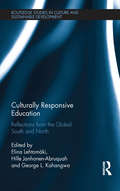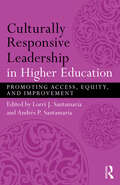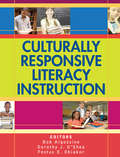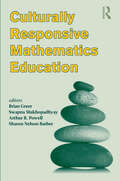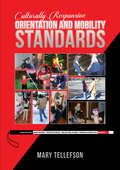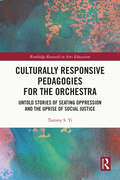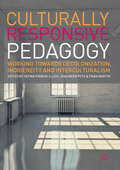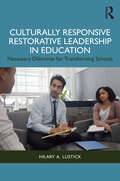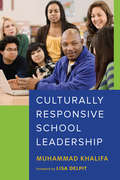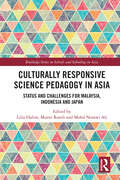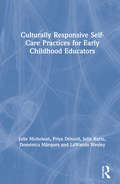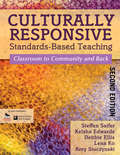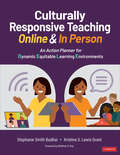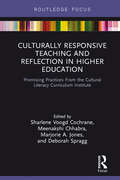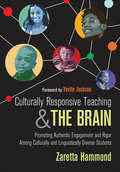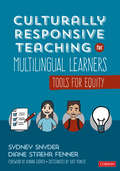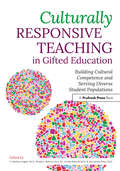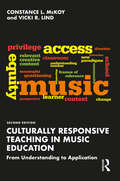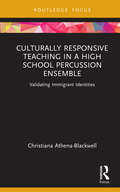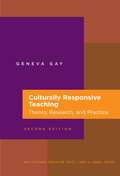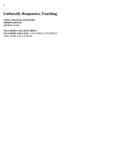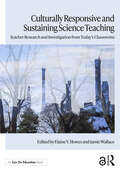- Table View
- List View
Culturally Responsive Education: Reflections from the Global South and North (Routledge Studies in Culture and Sustainable Development)
by Elina Lehtomäki Hille Janhonen-Abruquah George KahangwaCulturally Responsive Education: Reflections from the Global South and North examines culturally responsive education’s contribution to sustainable development and explores ways in which educational practitioners respond to cultures in and around educational contexts. This book argues that cultural responsiveness in education is invaluable for sustainability in and throughout education, and explores methods with which to deepen the understanding of the values and intercultural dialogue constantly present in education. Using a number of international and multidisciplinary studies, the authors offer a novel perspective on to the consideration of diversity throughout education and provide a valuable contribution to the ongoing global and national debate surrounding the UN Sustainable Development Goal initiative. With a focus on collaboration, this edited volume is vital reading for scholars, teachers and students of education, sociology, and development studies as well as education professionals. The book will also be of interest to education policy -makers and international and non-governmental organizations.
Culturally Responsive Leadership in Higher Education: Promoting Access, Equity, and Improvement
by Lorri Santamaría Andrés SantamaríaRapidly changing global demographics demand visionary, collaborative, and culturally appropriate leadership practices on university campuses. In the face of widening gaps in academic achievement and socio-economic roadblocks, Culturally Responsive Leadership in Higher Education offers a new vision of leadership, where diversity is transformed from challenge into opportunity. This book offers a range of perspectives from culturally, racially, linguistically, ability, and gender-diverse contributors who demonstrate that effective leadership springs from those who engage, link theory to practice, and promote access, equity, and educational improvement for underserved students. Each chapter explores a critical higher educational leadership issue with feasible strategies and solutions. In this exciting book, theory and research-based chapters unpack culturally responsive leadership, revealing how higher education leaders in the U.S. and international contexts can improve their practice for social equity and educational change.
Culturally Responsive Literacy Instruction
by Bob Algozzine Dorothy J O'Shea Dr Festus E. ObiakorImprove reading achievement for students from diverse backgrounds with research-supported practices and culturally responsive interventions in phonemic awareness, phonics/decoding, fluency, vocabulary, and comprehension.
Culturally Responsive Mathematics Education (Studies in Mathematical Thinking and Learning Series)
by Arthur B. Powell Brian Greer Swapna Mukhopadhyay Sharon Nelson-BarberAt a time of rapid demographic change and amidst the many educational challenges facing the US, this critical new collection presents mathematics education from a culturally responsive perspective. It tackles the most crucial issues of teaching mathematics to an ethnically diverse school population, including the political dimension of mathematics education within the context of governmental efforts to improve achievement in school mathematics. Culturally Responsive Mathematics Education moves beyond a point of view that is internal to mathematics education as a discipline, and instead offers a broad perspective of mathematics as a significant, liberating intellectual force in our society. The editors of this volume bring together contributions from many of the leading teachers, teacher educators, researchers, scholars, and activists who have been working to reorient mathematics education in ways that reflect mathematics education as accomplished, first and foremost, through human interactions.
Culturally Responsive Orientation and Mobility Standards
by Mary TellefsonAt last! The field of Orientation and Mobility (O&M) embraces the 21st Century Model for standards-based instruction with these research-based, peer-reviewed, and validated performance standards that correlate to success in career, college and community life.Commensurate with general education curriculum, these learner performance standards give important credibility to O&M instruction by providing measurable, age-appropriate and culturally responsive outcome targets to guide assessment and instruction. For those who don&’t understand what O&M is and for those who fund it, the O&M CCCRS clearly articulate and justify a learner&’s need for instruction, justify a level of service needed to meet age-appropriate performance targets and justify the tools need to do the job. This is a must resource for master and novel-level instructors alike.
Culturally Responsive Pedagogies for the Orchestra: Untold Stories of Seating Oppression and the Uprise of Social Justice (Routledge Research in Arts Education)
by Tammy S. YiThis innovative volume explores the potential of alternative seating practices (ASP) to revolutionize orchestral music teaching in US schools and beyond by improving musicians’ social and musical experiences, including peer mentorship. Challenging traditional hierarchical seating structures and drawing on longitudinal research and autoethnographic data, it explores the benefits of alternative seating practices on student learning, well-being, and overall musical performance. Rooted in critical discussion of the importance of social justice in music education, it describes new strategies for culturally responsive pedagogies and examines how educators and conductors can create a cohesive and collaborative orchestra guided by the principles of ethnic studies, while valuing and celebrating diversity among the members. It will be of interest to academics, scholars, and educators in music education and pedagogy, social justice education, and race and ethnic studies.
Culturally Responsive Pedagogy: Working towards Decolonization, Indigeneity and Interculturalism
by Fran Martin Fatima Pirbhai-Illich Shauneen PeteThis book convincingly argues that effective culturally responsive pedagogies require teachers to firstly undertake a critical deconstruction of Self in relation to and with the Other; and secondly, to take into account how power affects the socio-political, cultural and historical contexts in which the education relation takes place. The contributing authors are from a range of diaspora, indigenous, and white mainstream communities, and are united in their desire to challenge the hegemony of Eurocentric education and to create new educational spaces that are more socially and environmentally just. In this venture, the ideal education process is seen to be inherently critical and intercultural, where mainstream and marginalized, colonized and colonizer, indigenous and settler communities work together to decolonize selves, teacher-student relationships, pedagogies, the curriculum and the education system itself. This book will be of great interest and relevance to policy-makers and researchers in the field of education; teacher educators; and pre- and in-service teachers.
Culturally Responsive Restorative Leadership in Education: Necessary Dilemmas for Transforming Schools
by Hilary A. LustickCulturally responsive restorative leadership centers restorative justice as a process for school transformation. This book draws upon nearly a decade of combined fieldwork in public secondary schools across the country, helping the reader unpack challenges that leaders face as they implement restorative practices in their schools. Chapters explore the most common pressures facing leaders--within the school community and beyond—and how leaders can use these challenges as opportunities to reinforce their commitment to and purpose for restorative practices. This book helps principals earn buy-in from their school community, implement sustainable restorative systems, increase equity, and promote school cultural transformation. Chapters also include prompts for reflection to help the reader brainstorm how to approach these challenges in their own contexts. This is a timely and important book for aspiring and practicing educational leaders.
Culturally Responsive School Leadership (Race and Education)
by Muhammad KhalifaCulturally Responsive School Leadership focuses on how school leaders can effectively serve minoritized students—those who have been historically marginalized in school and society. The book demonstrates how leaders can engage students, parents, teachers, and communities in ways that positively impact learning by honoring indigenous heritages and local cultural practices. Muhammad Khalifa explores three basic premises. First, that a full-fledged and nuanced understanding of &“cultural responsiveness&” is essential to successful school leadership. Second, that cultural responsiveness will not flourish and succeed in schools without sustained efforts by school leaders to define and promote it. Finally, that culturally responsive school leadership comprises a number of crucial leadership behaviors, which include critical self-reflection; the development of culturally responsive teachers; the promotion of inclusive, anti-oppressive school environments; and engagement with students&’ indigenous community contexts. Based on an ethnography of a school principal who exemplifies the practices and behaviors of culturally responsive school leadership, the book provides educators with pedagogy and strategies for immediate implementation.
Culturally Responsive Science Pedagogy in Asia: Status and Challenges for Malaysia, Indonesia and Japan (Routledge Series on Schools and Schooling in Asia)
by Lilia Halim Murni Ramli Mohd Norawi AliScience learning, for many, is often seen as learning a culture of science knowledge and practices - that is incongruent from one’s everyday experiences and cultural background of learners. This edited volume presents a systemic view of the current initiatives and challenges for the inclusion of Culturally Responsive Science Pedagogy (CRSP) in non-western and multicultural contexts in three Asian countries – Malaysia, Indonesia and Japan. Split into three parts, the book examines the history and current educational systems, curriculums, and socio-cultural diversities in each country, offering an updated review of equity in education. It reflects and expands on the role of CSRP in diverse societies, before going into case studies that feature the experiences of teachers in implementing CRSP in Malaysia, Indonesia and Japan. These snapshots reflect the multiple ways equity is addressed in the teaching and learning of science in Asian countries, allowing readers to extrapolate the possible challenges and best practices for designing and implementing CRSP in practice. The final section examines how these findings provide a sustainable platform for building capacity in understanding of the cultural complexities and realities of recruiting and retaining diverse students into science. One of few books to investigate the role of CRSP in diverse societies in Malaysia, Indonesia and Japan, this book makes a unique contribution to the field of science education with reference to culturally responsive pedagogy. Its strategies and solutions serve as an important comprehensive reference for researchers and science teacher educators.
Culturally Responsive Self-Care Practices for Early Childhood Educators
by Julie Nicholson Julie Kurtz Priya Shimpi Driscoll Doménica Márquez LaWanda WesleyThe first self-care book designed specifically for the early childhood field, Culturally Responsive Self-Care Practices for Early Childhood Educators is filled with helpful strategies and tools that you can implement immediately. Recognizing that self-care is not one size fits all, the authors present culturally responsive strategies drawn from diverse early childhood staff working in a range of roles across communities and contexts. By tying the importance of educator self-care to goals of social justice and equity, this book advocates for increased awareness of the importance of self-care on both an individual and institutional level. Through key research findings, effective strategies and personal anecdotes, this accessible guide helps readers understand and engage with the critical role self-care and wellness-oriented practices play in creating strong foundations for high quality early learning programs.
Culturally Responsive Standards-Based Teaching: Classroom to Community and Back
by Steffen Saifer Keisha Edwards Debbie Ellis Lena Ko Amy StuczynskiClose the achievement gap by closing the culture gap Teaching children from diverse backgrounds begins with learning who they are, then using the knowledge and culture students bring to school in a standards-based curriculum to achieve student success. This guide provides tools that show why and how to create culturally responsive, standards-based (CRSB) instruction in the classroom. Results of effective programs include: Increased academic success for all learners Engaged and motivated students Strengthened partnerships between students, families, and communities
Culturally Responsive Teaching Online and In Person: An Action Planner for Dynamic Equitable Learning Environments (Corwin Teaching Essentials)
by Stephanie Smith Budhai Kristine S. GrantAn equitable, inclusive and practical application of culturally responsive teaching that transcends learning environments Educators in the 21st century are teaching diverse learners across a range of learning environments, while attending to critical issues related to equity, inclusion, and social justice. Now there’s a resource to help you merge the essential skills of embedding culturally responsive teaching practices into online and in person learning settings. Using the Dynamic Equitable Learning Environments (DELE) framework, you can build the knowledge, awareness, skills, and dispositions to pivot instruction to facilitate equitable, inclusive, and anti-racist learning experiences that transcend cultural, social, and linguistic backgrounds—no matter where, when, or how your students do their learning. Combining an interactive workspace with teacher preparation and professional development, this book provides an action planner and toolkit for embedding culturally responsive teaching into online and in person instruction. Other features include: Demonstrative, inspirational, and culturally responsive practical approaches for online and in person educational settings Self-reflection questions, anti-bias exercises, and critical-thinking activities that support equity-mindedness Culturally sustaining checklist templates Links to additional responsive online resources, readings, and culturally relevant media Action plan templates to work through in each chapter Additional Call to Action practices to pursue after completing the book When you commit to culturally responsive teaching, you want to build your own capacity to provide every learner, in every educational setting, the ability to connect with the curriculum in authentic and equitable ways. This book enables you to do just that by providing the pedagogical strategies to meaningfully engage all learners, especially in online settings, and ensure that your class is inclusive, decolonized, and takes into account the diverse lived experiences of all learners, their families, and communities.
Culturally Responsive Teaching Online and In Person: An Action Planner for Dynamic Equitable Learning Environments (Corwin Teaching Essentials)
by Stephanie Smith Budhai Kristine S. GrantAn equitable, inclusive and practical application of culturally responsive teaching that transcends learning environments Educators in the 21st century are teaching diverse learners across a range of learning environments, while attending to critical issues related to equity, inclusion, and social justice. Now there’s a resource to help you merge the essential skills of embedding culturally responsive teaching practices into online and in person learning settings. Using the Dynamic Equitable Learning Environments (DELE) framework, you can build the knowledge, awareness, skills, and dispositions to pivot instruction to facilitate equitable, inclusive, and anti-racist learning experiences that transcend cultural, social, and linguistic backgrounds—no matter where, when, or how your students do their learning. Combining an interactive workspace with teacher preparation and professional development, this book provides an action planner and toolkit for embedding culturally responsive teaching into online and in person instruction. Other features include: Demonstrative, inspirational, and culturally responsive practical approaches for online and in person educational settings Self-reflection questions, anti-bias exercises, and critical-thinking activities that support equity-mindedness Culturally sustaining checklist templates Links to additional responsive online resources, readings, and culturally relevant media Action plan templates to work through in each chapter Additional Call to Action practices to pursue after completing the book When you commit to culturally responsive teaching, you want to build your own capacity to provide every learner, in every educational setting, the ability to connect with the curriculum in authentic and equitable ways. This book enables you to do just that by providing the pedagogical strategies to meaningfully engage all learners, especially in online settings, and ensure that your class is inclusive, decolonized, and takes into account the diverse lived experiences of all learners, their families, and communities.
Culturally Responsive Teaching and Reflection in Higher Education: Promising Practices From the Cultural Literacy Curriculum Institute
by Deborah Spragg Marjorie A. Jones Meenakshi Chhabra Sharlene Voogd CochraneCulturally Responsive Teaching and Reflection in Higher Education explores how postsecondary educators can develop their own cultural awareness and provide inclusive learning environments for all students. Discussing best practices from the Cultural Literacy Curriculum Institute at Lesley University, faculty and administrators who are committed to culturally responsive teaching reflect on how to create an inclusive environment and how educators can cultivate the skills, attitudes, and knowledge necessary for implementing culturally responsive curriculum and pedagogy. Rather than a list of "right answers," essays in this important resource integrate discussion and individual reflection to support educators to enhance skills for responding effectively to racial, cultural, and social difference in their personal and professional contexts. This book is as an excellent starting point or further enrichment resource to accompany program or institutional diversity and inclusion efforts.
Culturally Responsive Teaching and The Brain: Promoting Authentic Engagement and Rigor Among Culturally and Linguistically Diverse Students
by Zaretta L. HammondA bold, brain-based teaching approach to culturally responsive instruction To close the achievement gap, diverse classrooms need a proven framework for optimizing student engagement. Culturally responsive instruction has shown promise, but many teachers have struggled with its implementation—until now. In this book, Zaretta Hammond draws on cutting-edge neuroscience research to offer an innovative approach for designing and implementing brain-compatible culturally responsive instruction. The book includes: Information on how one’s culture programs the brain to process data and affects learning relationships Ten “key moves” to build students’ learner operating systems and prepare them to become independent learners Prompts for action and valuable self-reflection
Culturally Responsive Teaching and The Brain: Promoting Authentic Engagement and Rigor Among Culturally and Linguistically Diverse Students
by Zaretta L. HammondA bold, brain-based teaching approach to culturally responsive instruction To close the achievement gap, diverse classrooms need a proven framework for optimizing student engagement. Culturally responsive instruction has shown promise, but many teachers have struggled with its implementation—until now. In this book, Zaretta Hammond draws on cutting-edge neuroscience research to offer an innovative approach for designing and implementing brain-compatible culturally responsive instruction. The book includes: Information on how one’s culture programs the brain to process data and affects learning relationships Ten “key moves” to build students’ learner operating systems and prepare them to become independent learners Prompts for action and valuable self-reflection
Culturally Responsive Teaching for Multilingual Learners: Tools for Equity
by Diane Staehr Fenner Sydney Cail SnyderWhat will you do to promote multilingual learners’ equity? Our nation’s moment of reckoning with the deficit view of multilingual learners has arrived. The COVID-19 pandemic has further exposed and exacerbated long-standing inequities that stand in the way of MLs’ access to effective instruction. Recent events have also caused us to reflect on our place as educators within the intersection of race and language. In this innovative book, Sydney Snyder and Diane Staehr Fenner share practical, replicable ways you can draw from students’ strengths and promote multilingual learners′ success within and beyond your own classroom walls. In this book you’ll find • Practical and printable, research-based tools that guide you on how to implement culturally responsive teaching in your context • Case studies and reflection exercises to help identify implicit bias in your work and mitigate deficit-based thinking • Authentic classroom video clips in each chapter to show you what culturally responsive teaching actually looks like in practice • Hand-drawn sketch note graphics that spotlight key concepts, reinforce central themes, and engage you with eye-catching and memorable illustrations There is no time like the present for you to reflect on your role in culturally responsive teaching and use new tools to build an even stronger school community that is inclusive of MLs. No matter your role or where you are in your journey, you can confront injustice by taking action steps to develop a climate in which all students’ backgrounds, experiences, and cultures are honored and educators, families, and communities work collaboratively to help MLs thrive. We owe it to our students. On-demand book study-Available now! Authors, Snyder and Staehr Fenner have created an on-demand LMS book study for readers of Culturally Responsive Teaching for Multilingual Learners: Tools for Equity available now from their company SupportEd. The self-paced book study works around your schedule and when you′re done, you’ll earn a certificate for 20 hours of PD. SupportEd can also customize the book study for specific district timelines, cohorts and/or needs upon request.
Culturally Responsive Teaching for Multilingual Learners: Tools for Equity
by Diane Staehr Fenner Sydney Cail SnyderWhat will you do to promote multilingual learners’ equity? Our nation’s moment of reckoning with the deficit view of multilingual learners has arrived. The COVID-19 pandemic has further exposed and exacerbated long-standing inequities that stand in the way of MLs’ access to effective instruction. Recent events have also caused us to reflect on our place as educators within the intersection of race and language. In this innovative book, Sydney Snyder and Diane Staehr Fenner share practical, replicable ways you can draw from students’ strengths and promote multilingual learners′ success within and beyond your own classroom walls. In this book you’ll find • Practical and printable, research-based tools that guide you on how to implement culturally responsive teaching in your context • Case studies and reflection exercises to help identify implicit bias in your work and mitigate deficit-based thinking • Authentic classroom video clips in each chapter to show you what culturally responsive teaching actually looks like in practice • Hand-drawn sketch note graphics that spotlight key concepts, reinforce central themes, and engage you with eye-catching and memorable illustrations There is no time like the present for you to reflect on your role in culturally responsive teaching and use new tools to build an even stronger school community that is inclusive of MLs. No matter your role or where you are in your journey, you can confront injustice by taking action steps to develop a climate in which all students’ backgrounds, experiences, and cultures are honored and educators, families, and communities work collaboratively to help MLs thrive. We owe it to our students. On-demand book study-Available now! Authors, Snyder and Staehr Fenner have created an on-demand LMS book study for readers of Culturally Responsive Teaching for Multilingual Learners: Tools for Equity available now from their company SupportEd. The self-paced book study works around your schedule and when you′re done, you’ll earn a certificate for 20 hours of PD. SupportEd can also customize the book study for specific district timelines, cohorts and/or needs upon request.
Culturally Responsive Teaching in Gifted Education: Building Cultural Competence and Serving Diverse Student Populations
by Wendy A. Behrens Cecelia Boswell Joy Lawson Davis C. Matthew FugateCulturally Responsive Teaching in Gifted Education is a professional learning tool for practitioners who are working to create more culturally responsive school and classroom environments. This book:Focuses on gifted and talented students from special populations, including those who are culturally, linguistically, and economically diverse.Is presented as a collection of essays written by educational advocates.Aims to increase the cultural competence of teachers and school leaders.Is organized in three sections: Culturally Responsive Practices; Race, Ethnicity, and Culture; and Gender, Sex, and Sense of Self.Provides readers with personal insights into the implicit biases that exist within the educational system and gifted programs.Each chapter illustrates the lived experiences of students from special populations and includes reflection questions for continued conversations and planning. Finally, an Educator Inventory is provided that tasks educators with reflecting on their own personal implicit biases and classroom practices related to the diverse populations of gifted and talented students in our schools.
Culturally Responsive Teaching in Music Education: From Understanding to Application
by Vicki R. Lind Constance L. McKoyCulturally Responsive Teaching in Music Education: From Understanding to Application, Second Edition, presents teaching methods that are responsive to how different culturally specific knowledge bases impact learning. It offers a pedagogy that recognizes the importance of including students’ cultural references in all aspects of learning. Designed as a resource for teachers of undergraduate and graduate music education courses, the book provides examples in the context of music education, with theories presented in Part I and a review of teaching applications in Part II. Culturally Responsive Teaching in Music Education is an effort to answer the question: How can I teach music to my students in a way that is culturally responsive? This book serves several purposes, by: Providing practical examples of transferring theory into practice in music education. Illustrating culturally responsive pedagogy within the classroom. Demonstrating the connection of culturally responsive teaching to the school and larger community. This Second Edition has been updated and revised to incorporate recent research on teaching music from a culturally responsive lens, new data on demographics, and scholarship on calls for change in the music curriculum. It also incorporates an array of new perspectives from music educators, administrators, and pre-service teachers—drawn from different geographic regions—while addressing the impact of the Covid-19 pandemic and the 2020 social justice protests.
Culturally Responsive Teaching in a High School Percussion Ensemble: Validating Immigrant Identities (Routledge Focus on Music Education: Culturally Responsive Teaching)
by Christiana Athena-BlackwellCulturally Responsive Teaching in a High School Percussion Ensemble: Validating Immigrant Identities addresses themes of immigration, identity, and culturally responsive teaching in music education using a deep case study of Brazilian samba music in the context of a high school percussion ensemble.Through an in-depth ethnographic study of the World Percussion Ensemble at Somerville High School, Massachusetts, and how it was renovated by a progressive music program director, the author demonstrates how a program can respond to the cultures and needs of immigrant students by creating a unique intercultural community within the classroom. The book recognizes key components in the process of immigrant social integration: (1) music education can help facilitate immigrant students’ adjustment to a new culture as they negotiate a hybrid identity. (2) The inclusive nature of samba percussion music encourages communication, cooperation, and empathy, helping students to build life skills. (3) By blending rhythms from their countries of origin with a pop song of choice for their final composition, the students create their own interculture.Deriving from culturally responsive music teaching practices, this study will inspire music teachers and music education researchers to transfer some of the methods to center students’ languages, identities, and cultural references in their curricula.
Culturally Responsive Teaching: Theory, Research and Practice Second Edition
by Geneva GayCombining insights from multicultural education theory and research with real-life classroom stories, Gay demonstrates that all students will perform better on multiple measures of achievement when teaching is filtered through their own cultural experiences.
Culturally Responsive Teaching: Theory, Research, And Practice (Multicultural Education Ser.)
by Geneva GayGeneva Gay is renowned for her contributions to multicultural education, particularly as it relates to curriculum design, professional learning, and classroom instruction. Gay has made many important revisions to keep her foundational, award-winning text relevant for today’s diverse student population, including: new research on culturally responsive teaching, a focus on a broader range of racial and ethnic groups, and consideration of additional issues related to early childhood education. Combining insights from multicultural education theory with real-life classroom stories, this book demonstrates that all students will perform better on multiple measures of achievement when teaching is filtered through students’ own cultural experiences. This perennial bestseller continues to be the go-to resource for teacher professional learning and preservice courses.
Culturally Responsive and Sustaining Science Teaching: Teacher Research and Investigation from Today's Classrooms
by Elaine V. Howes Jamie WallaceHow can research into culturally responsive and sustaining education (CRSE) inform and transform science teaching and learning? What approaches might teachers use to study CRSE in their classrooms? What are teachers learning from their research that might be transferable to other classrooms and schools?In this practical resource, teacher researchers from the Culturally Responsive and Sustaining Education Professional Learning Group based in New York City provide insights for educators on how to address complex educational and sociocultural issues in the science classroom. Highlighting wide-ranging and complex problems such as the COVID-19 pandemic and racial injustice and how they affect individual science instruction settings, with a particular focus on urban and high-need school environments, chapters examine and describe what CRSE is and means for science teaching.Through individual and collaborative research studies, chapters help readers understand various approaches to developing and implementing CRSE strategies in their classrooms and promote students’ identification with and affinity for science. Teachers describe the questions driving their investigations, data, and findings, and reflect on their roles as agents of change. Chapters also feature discussion and reflection questions, and include examples of assignments, protocols, and student work that teachers have piloted in their classes.This book is ideal for pre-service and in-service science teachers and teacher educators across grade levels. It provides support for professional learning activities, as well as undergraduate and graduate teacher education courses. It may be particularly useful in science methods, multicultural education; and diversity, equity, and inclusion courses with a focus on CRSE. This book not only defines one group’s approach to CRSE in science education, but also takes the next step to show how CRSE can be applied directly to the science classroom.
